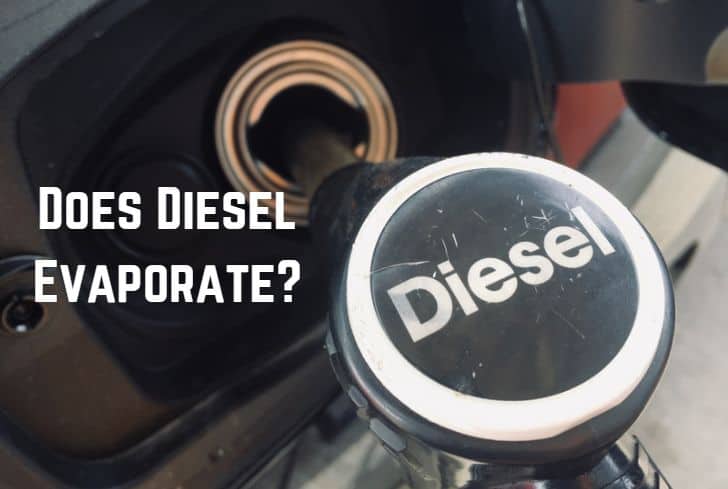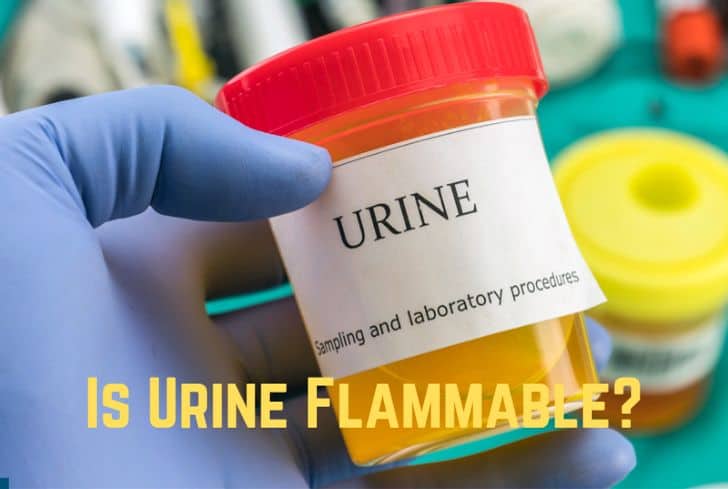Does Diesel Evaporate? (Yes. But Slowly)

The driveway where you regularly park your car has undoubtedly seen a few fuel spills. It’s easy to blame diesel leaks on them. You find cleaning up your driveway in the morning challenging, but the diesel spills are gone when you return in the evening. Does that imply they were cleaned up by someone else, or did they evaporate? Does diesel evaporate, then?
This article responds to that question. You’ll learn the temperatures and duration of diesel evaporation. Also, we inform you if diesel evaporates quicker than water and to what extent diesel evaporates from concrete and clothing. Last, we’ll tell you what to do if you spill diesel.
Read: Is Diesel Flammable?
Does Diesel Fuel Evaporate?
Diesel fuel does evaporate. Its evaporation rate is slower than other fuels, primarily because it’s denser and more oily. Compared to most other fuels, diesel has longer chains of carbon atoms. Weak interparticle interactions exist in the diesel carbons. Diesel fuel changes its physical properties when it evaporates.
One of the changes is an increase in viscosity. Due to the high pressure, diesel with a high viscosity might damage the fuel pump—lower viscosity results in inadequate lubrication. Diesel fuel delivery speed is influenced by viscosity. It also affects the fuel atomization of diesel fuel during the injection.
Another change is a decrease in API gravity. Lower API gravity indicates that the diesel is getting heavier and denser, which decreases its value. A higher API gravity suggests that the density of the diesel is becoming lighter. A lighter density of diesel is valued more highly since it produces more highly valuable light products.
How Long Does Diesel Take To Evaporate?
Most diesel oil spills will disappear within a few hours or days. Diesel oil evaporation causes it to lose 40% of its volume in cold weather. If strong winds exist, that will take around 48 hours or even less time for the diesel to evaporate. The evaporation rate also depends on the temperature and the spilt amount.
But still, it also depends on how big or tiny the spill is. Little spills (500–5000 gallons) can evaporate in a day or less. If there is a spill on water, it soon forms a thin layer and evaporates. But that is the “marine diesel” version, which is lighter.
Diesel spills on the ground will take more time to evaporate than if the spill happened on the water. The diesel spill will contaminate the soil and be a fire hazard.
What Temperature Does Diesel Evaporate?
The flash point of diesel is 125–180 °F (52–82 °C). The lowest temperature at which diesel evaporates in the presence of a heat source is known as its flashpoint. There are four different types of diesel, which explains the variance. However, the standard flash point value is 140°F (60°C). But, because these vapors are flammable, you must exercise caution.
Evaporation occurs on the surface, usually below the boiling point. The boiling point of diesel ranges from 392- 662 °F(200 to 350 °C). Evaporation is the process of any liquid converting to vapor at a lower temperature than its boiling point. The heat energy from the surroundings is transferred to the diesel molecules at the surface’s top.
The cohesive forces between the diesel molecules at the top and those below are broken. After they have accumulated enough energy, the diesel molecules at the top evaporate.
Does Diesel Evaporate Quicker Than Water?
Compared to water, diesel fuel evaporates faster. It is far lighter than water and will float on water. It is this factor that makes diesel evaporate quicker than water. Water and diesel do not mix. In the presence of diesel, water becomes a pollutant. Diesel begins to evaporate when the mixture is heated or the temperature rises.
Unfortunately, there will be occasions when water damage occurs to diesel-powered equipment. Water in diesel fuel can be either free water or water in a solution. Free water can seriously damage the equipment’s water separators. Some will blow up, like the fuel injector tips.
Diesel fuel has low concentrations of water in the solution. The water usually does not cause any problems with the equipment.
Does Diesel Evaporate From Clothes?
Diesel evaporates quite slowly. Therefore it could take some time for it to leave your clothes. Given that it is petroleum-based, it has a strong smell. Due to its composition of sulfur and nitrogen, diesel soaks through the clothes and stays on even after washing. It is greasy, denser, and more likely to absorb into clothing, which is the primary cause.
But what should you do if it takes some time for the diesel to evaporate and you don’t want your clothes to smell? Here are a few tips to help remove diesel from your clothes much faster.
- Heavy-duty detergent: You can use a powerful detergent made specifically to eliminate grease and oil stains. Put your clothes in cold water to soak, then use heavy-duty detergent, mostly on diesel-containing parts. In addition, you can use the powerful detergent instead of your regular detergent.
- Vinegar and baking soda: Baking soda and vinegar combined will do wonders for removing diesel. Add a scoop of baking soda, detergent, and white vinegar to the washing and the stained clothes contaminated by the diesel. The mixture is weak, so you should repeat the procedure.
If vinegar is not available, you can use combine cola and rubbing alcohol with baking soda.
- Mouthwash: One of the best mouthwashes for getting rid of diesel is Listerine. You can soak the clothes in Listerine or add them when doing laundry. It’s so good for getting rid of the smell that firefighters use it to get rid of the smoke smell. Remember not to use a tumble dryer for diesel-stained clothes, which might result in flames or explosions.
Will Diesel Evaporate From Concrete?
Diesel will not readily evaporate from concrete. It will stain concrete if left on the surface for a while. Diesel fuel will quickly seep into the concrete’s pores and cracks. The porous nature of concrete makes it easy for diesel to infiltrate. Diesel fuel has a more challenging time evaporating because of that.
Diesel has the following effects on concrete as a result of its inability to evaporate:
- Because diesel is a flammable substance, it weakens and stabilizes concrete.
- Accelerate the concrete’s corrosive process.
- It causes concrete to become discolored.
What to Do if You Spill Diesel?
Accidents do happen, and it’s possible to spill diesel. If you discover a fresh diesel fuel spill immediately, you can clean it up using an absorbent material. It could take longer to clean up an older spill.
Here’s a short rundown on cleaning up an old fuel spill.
- Get your pressure washer out and adjust the pressure to a medium setting. A minimum of two feet should separate the nozzle from the spill.
- Use a mild degreaser and detergent, then scrape the area with a brush.
- Use a wet vacuum cleaner to properly dry the surface and remove the last of the diesel and detergent.
- Before applying an absorbent material, allow the region to dry completely and then give it some time to relax. Diesel can also be effectively absorbed by cat litter.
- Lastly, properly dispose of the absorbent material with a broom.
Some individuals might wait for the rain to clean up the diesel spillage if it happened outdoors. Because diesel includes small molecules and dissolves in water, it can be washed away by rain. The raindrop droplets break down and disperse the fuel molecules before being carried away.
However, remember that this is how diesel is dumped into bodies of water like lakes and rivers. As a result, avoid waiting for the rain to wash the diesel away.
FAQ’s
How long does diesel stay in soil?
Under typical circumstances, it can take a minor diesel spill 2 to 4 years to completely break down in the soil. Diesel can remain in the soil for up to 8 years in colder climates.
If the diesel spill stays in the top few feet of the soil, no plants will grow there. Little animals, insects, and bugs will all die due to the diesel spill. To eliminate the toxicity, try to clean up a diesel spill as soon as possible.
How long is diesel stable?
Diesel has a one-year shelf life on average when stored below 68°F (20°C). Unfortunately, only underground storage tanks make this possible. The shelf life is shortened at temperatures over 86°F (30°C). The shelf life decreases with increasing temperature.
But, additional variables influence the diesel’s shelf life in addition to temperature. Water promotes the development of bacteria and fungi, which destabilizes the fuel. Sand, dust, and dirt are contaminants that affect how stable diesel is. Diesel’s shelf life is also impacted by fuel mix.
Read: Does Lighter Fluid Evaporate?
Conclusion
Diesel does, however, evaporate more slowly than most other fuels do. It has longer carbon atom chains, is oily, and is denser. Diesel’s viscosity and API gravity are affected by evaporation, which can either increase or decrease its value.
Diesel evaporation is faster than water, although it takes longer if it spills on cloth or concrete. Removing diesel from clothing or concrete will be tough if the spill is old. Thankfully, we have advised you on how to get rid of diesel.






